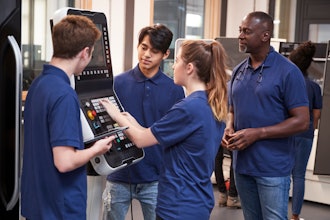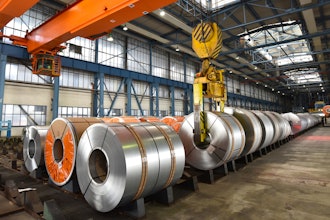No, we didn’t make that up. It’s the actual title of a paper produced by two PhDs in association with the University of Oxford. According to that paper, it seems that engineers are predisposed to radicalism...
Abstract. We find that graduates from subjects such as science, engineering, and medicine are strongly overrepresented among Islamist movements in the Muslim world, though not among the extremist Islamic groups which have emerged in Western countries more recently. We also find that engineers alone are strongly over-represented among graduates in violent groups in both realms. This is all the more puzzling for engineers are virtually absent from left-wing violent extremists and only present rather than over-represented among right-wing extremists. We consider four hypotheses that could explain this pattern. Is the engineers’ prominence among violent Islamists an accident of history amplified through network links, or do their technical skills make them attractive recruits? Do engineers have a ‘mindset’ that makes them a particularly good match for Islamism, or is their vigorous radicalization explained by the social conditions they endured in Islamic countries? We argue that the interaction between the last two causes is the most plausible explanation of our findings, casting a new light on the sources of Islamic extremism and grounding macro theories of radicalization in a micro-level perspective.
That’s according to professors Diego Gambetta and Steffen Hertog. Gambetta is Reader in Sociology at the University of Oxford, and Hertog received his PhD in politics from the University of Oxford, working on the political economy of Saudi Arabia.The above abstract is from their 90-page “sociology working paper” displaying the cover title, in small type, “Engineers of Jihad.”
Before proceeding, please note that emboldened and italicized passages here are exact, unedited quotes from that paper (save for the removal of extra spaces).
The authors seek to show that a disproportionately high number of Islamic terrorists are engineers, citing such present-day examples as Mohammad Atta (architectural engineer) and others going back to the ‘70s and ‘80s, including Muhammad Abd al-Salam Faraj (electrical engineer) whom, the authors state, was related to the assassination of Anwar Sadat. An attempt very early on to support their point includes…
“during the tour, Zawahiri proudly pointed out students who were painting posters for political demonstrations, and he boasted that the Islamist movement had found its greatest recruiting success in the university's two most élite faculties—the medical and engineering schools. ‘Aren't you impressed by that?’
Also…
While appealing to madrasa students and the disenfranchised, in South East Asia Jamaa Islamiya also recruited “many technical faculty members, including architects, engineers, geophysicists, chemists, and robotics engineers”, and the three leading suspects in the September 2004 bombing of the Australian Embassy in Jakarta have an engineering background.
Lest one possibly think from the tone of the paper suggests that all Islamic fundamentalist groups are evil…
Soon after it was founded in 1982, Hezbollah established Jihad al-Binaa, an organizational branch devoted to the reconstruction of civil infrastructure and private housing. According to Hezbollah expert Judith Palmer Harik, “this is an interesting organization because it is chock-full of professionals – contractors, engineers, architects, demographic experts.”
I would hope that a group devoted to infrastructure and housing would, indeed, be “chock full of” technical professionals. Otherwise, one’s infrastructure could very well turn out like a failed weekend Home Depot project, no?
The authors present, with alarming consistency, their utter surprise that many terrorists are of a technical nature, and even reference ‘the engineering mindset’…that of an anti-social, radical nerd.
Is it just me? When I think of ‘terrorism’, I imagine things like bombs and detonators and structures and infrastructure and seriously dangerous materials and ‘masterminding.’ I would think that such things require not only a high degree of technical knowledge, but also more-than-fair levels of intelligence (besides the brain surgeon who set his shoes on fire, thus causing a national footwear security crisis). It takes TECHNICALLY MINDED PEOPLE—often, but not always, engineers—to design and assemble and activate not only the related technical tools, but to and plan and execute acts resulting in tragic destruction. It takes similar skills, education, and foresight to prevent and thwart such acts.
Do we really need Oxford University professors to ‘prove’ such things? No. The non-technical people who make bombs tend to be rather self-eliminating. Even the technical ones who yearn for a quick path to an afterlife o’ virgins tend to eliminate themselves—very unfortunately, along with others. Remember, though, that it’s going to take good, pure-of-heart engineers to defeat the evil bastards.
With no offense to those in construction, but c’mon. Would drywallers make good terrorists? “We’re going to drywall ALL of you into this stadium, infidels!”
The paper cites statistics related to very, very small numbers of people For instance, one sample group of 196 Islamic radicals included 78 people pursuing higher education within the broad category of engineering (which, the authors define, includes computer science and architecture). In the report, see Fig. 2 on page 11.
Table 2 on page 13 of the paper is interesting. Here, the authors show the numbers and percentages of engineers involved in a variety of terrorist attacks including, for example, 9/11 and the WTC bombings. The percentages of engineers (with “finished or unfinished” efforts in higher education) involved in those incidents are 57.1 and 41.7 respectively. Bali comes in at 66.7.
In soon-to-follow verbiage within the paper, the following is stated…stated…
This means that the share of radical Islamic engineers is no less than nine times greater than the share we could expect if the proneness of engineers to radicalize was the same as that of the male adult population.
The authors suppose an interesting direction: engineers radicalize. On the other hand, I don’t see the authors trying to prove the reverse: that it’s handy and serves many of their purposes for radicals to become engineers.
The following is just incredible (Page 19 if you’re following along). Here, I thought I’ve made some leaps of thought in my time…
Before attempting to explain what’s ‘wrong’ with engineers, we must consider the further question of whether they are overrepresented also among a different group of violent Islamic extremists from the ones we considered in the first sample, namely those born in or residents of Western countries who became active in recent times, mostly after 9/11.
What’s wrong with engineers? How could seemingly intelligent, highly educated (characteristics that aren’t necessarily associated) authors (of real books, apparently) begin ANY related thought process in such a way as to assume that there’s something wrong with engineers, and seemingly ignore the radical-TO-engineer direction so very consistently? Anyone care to comment on what’s wrong with sociologists?
This is akin to looking at a sample group of people who build houses, and wonder why there’s such a high proportion of trades people who are good with their hands.
The paper continues with many impressive charts, graphs, and data demonstrating the authors finger-pointing at the number of highly educated individuals involved in “acts/plots.” Frustrating as hell to read. Question: Is it wrong that many in other countries around the world seem to apply their capacity to absorb technical and valuable knowledge? Compared to what? Laboring through a liberal arts degree program while living with their parents well into their thirties?
It’s not until page 37 that something, to me, seems reasonable…
A stark example of the uselessness of conventional profiling is that the German authorities after 9/11 collected and analyzed data on over 8 million individuals, whittling them down first to 32,000 and then to 1,689 on the basis of a set of demographic characteristics (male, 18-40 years old, current or former student, Islamic, legal resident in Germany, and originating from one of a list of 26 Muslim countries) and of their “relevant knowledge to carrying out a terrorist attack” (such as a pilot licence) and “familiarity with places that could constitute possible terrorist targets” (such as working in “airports, nuclear power plants, chemical plants, the rail service, laboratories and other research institutes, and also students of German language at the Goethe Institutes”). The 1,689 were investigated one by one but none of them was found to be nurturing terrorist plots. Others who were arrested by contrast did not fit the profile
Finally, a good and certainly ample sample group, with a logical conclusion based on what’s apparently serious research—research not carried out and data, thankfully, not analyzed, by the paper’s authors.
Page 44 continues with the even-more-incredible, implying that engineers—by nature—were key elements in both Mussolini’s regime and the Third Reich. Clearly, technology was a crucial component of the latter. The basis, however, is again the authors’ seriously flawed assumption that engineering somehow leads to radicalism, not that radicals logically gravitate to a discipline that will help further their goals. Tough to overthrow much with an English degree. (Your pissant nouns are powerless against our verbs!)
What about the political orientation of engineers in the U.S.? The paper finally gets into that halfway through, on page 45. Again, the data (relatively old data, from 1984, ironically) was found, not gathered, leading to…
The proportion of engineers who declare themselves to be on the right of the political spectrum is greater than in any other disciplinary group: 57.6 per cent of them are either conservative or strongly conservative, as compared to 51.1 of economists, 42.5 of doctors and 33.5 per cent of scientists, 21.4 per cent of those in the humanities, and 18.6 per cent of the social scientists, the least right-wing of all disciplinary groups. Engineers are also one and a half to 16 times more likely to be “strongly conservative” than those in other subjects, and only 1.4 per cent of them are on the left, as opposed to 12.9 per cent in the social sciences and 16.7 in law. By what seems like an uncanny coincidence, the four fields at the top of the conservatism scale – engineering, economics, medicine, and science – are the same four secular fields we found at the top of our main jihadist sample.
Most engineers in the U.S. are conservative. Well, at least they were in ’84. It’d be interesting to see how, if at all, this ‘profile’ has changed in the past 25 years, but the authors must’ve chosen to spend their grant monies elsewhere. The last sentence of that passage raises an interesting point, perhaps indicating that the world is en route to a grand confrontation of extremism. Now that’s impressive. We have to read this stuff from the dear profs in order to see that one coming.
Readers over at EE Times are in an uproar over the paper. Various engineering forums that I’ve visited on the topic show a large number of extremely honked off people—mostly engineers, go figure. Engineering societies have been pretty quiet. Ban the paper? No. That free speech thing. Come out against it? Sure. Go for it.
I made it to page 54 of the paper before hurling it across my office. The trigger?
The data we used so far on both political and religious attitudes concerns only the US, so we do not know whether this combination of traits is found also among engineers in other countries. Engineering programs are probably similar all over the world, yet who gets selected into them might vary from country to country: social position and prestige of engineering could differ, as could the broader socio-political context that drives specific constituencies to opt for engineering degrees. Unfortunately, there is a surprising dearth of data on political or religious orientations by type of degree. In the many surveys around the world which we checked, the type of degree is not recorded; and in the very few cases in which it is, the number of graduates is either too small or opinions are not recorded. We have however been able to assemble some data of lesser quality on non-US countries which indicate that engineers disproportionately combine religiousness and a conservative ideology elsewhere too.
It would have been a helluva lot easier for the authors to have stated, as Richard Bach did with Illusions, that “everything in this book may be wrong.”
Further Reading
Engineers Make Good Terrorists? Source: Slashdot, April 3, 2008
Engineers Have a Terrorist Mindset? Source: Slashdot, January 29, 2008
Misunderstander of Islam Rises High in Al-Qaeda Source: JihadWatch.org, April 5, 2008
Engineers of Jihad Source: Department of Sociology University of Oxford
Engineering 'Mindset' Doesn't Include Politics Source: EE Times, April 2, 2008
Planning Skills Make Engineers Good 'Field Operatives' Source: EE Times, April 3, 2008


















